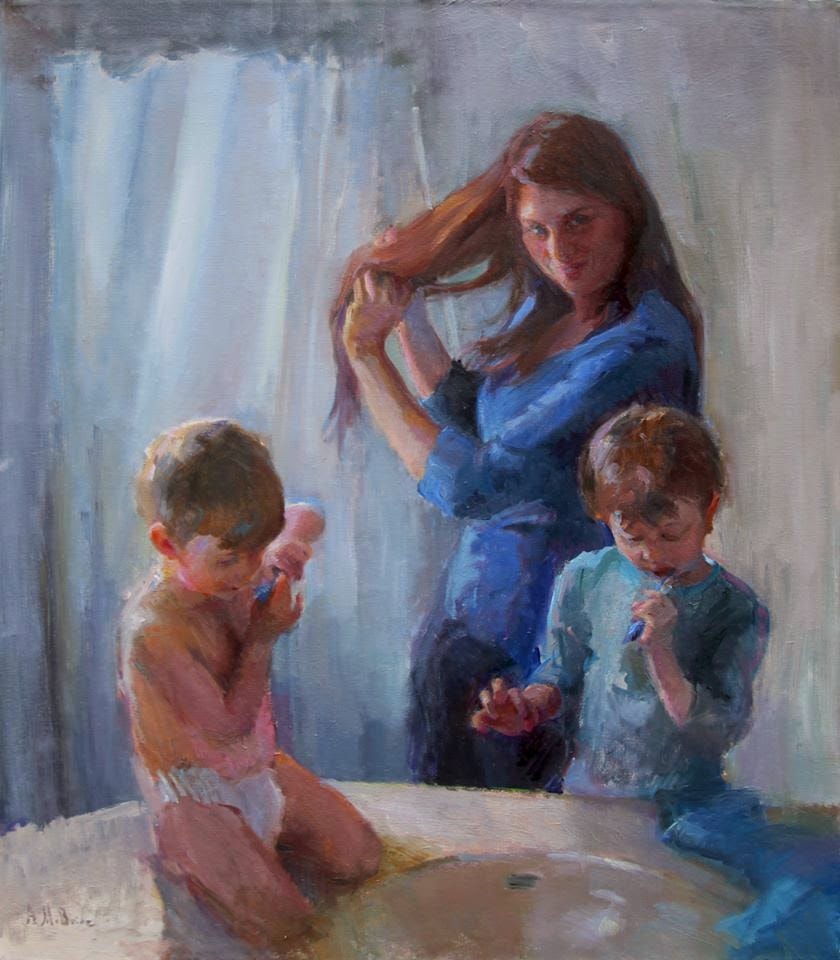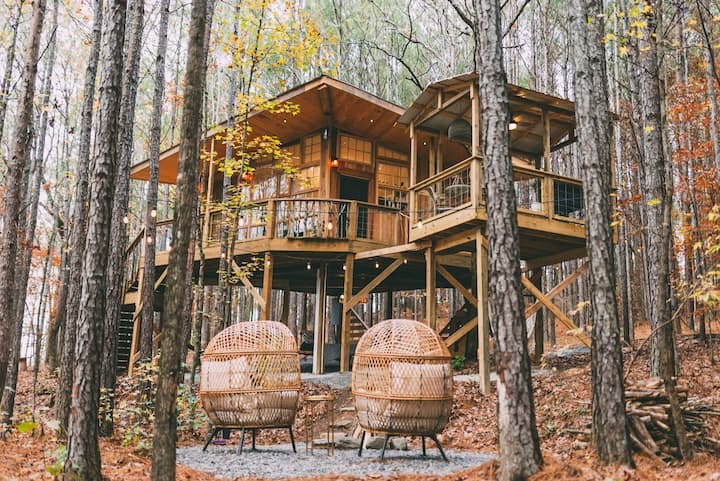Edition #115: The Paradox of Parenthood
Plus, six forces that fuel friendship, the most touching Humans of New York story, and some cool photos
A Note From the Editor
It was one of those dinners that lasted for hours. The lights were dimmed, our faces illuminated by low-burning candles as we sat around a small bistro table at my friend’s apartment in Brooklyn. We’d procured a feast of fresh seafood and paired it with frozen french fries from a bag. As we cracked the impenetrable shells of our lobsters, picking sweet meat from their spiky claws while liberally refilling our glasses with natural wine, our conversation glided from the traits of our imagined future spouses to procreation. We spoke about parenting philosophically, as though we were discussing Marxism or Communism—something we had general ideas and opinions about that were mostly founded on guesswork and intuition, as none of us were parents yet.
As a major fan of hypothetical situations and sweeping platitudes, I posed a question to the group: “What is the single most important value you’d like to bestow upon your future child, should you choose to have one?” The benefit of asking such a question is that I could be the last to answer, giving me some time to consider my answer. I listened as my friends shared thoughtful, often surprising responses—one said independence, citing a story in which her father presented her with a unique tactic in handling middle school bullies; indifference. A mean girl had sent her an Instant Message ending their friendship for no reason. Her father told her to reply, “So what?” and she did. It worked. The bully was baffled over not getting a reaction, and as such, the bully left her alone. The lesson stuck with my friend all these years later.
When I reflect on the answers given that night, it becomes abundantly clear that we all cited the best parts of ourselves—thoughtfulness, independence, and open-mindedness. That isn’t entirely surprising, as the intention of parenting, whether conscious or not, always seems to contain the idea that we can pass off the best parts of ourselves to these new, unencumbered humans our bodies create. While this passing of the self-proclaimed “good’ traits isn’t ill-intentioned, parenting is never purely altruistic. It can’t be, for there will always be that small part of us that has hopes for our future child. Some of them are dressed up as altruism—creating another human who feels an obligation to care for others, say—but there is an equal or greater degree of laden selfishness in the act. Consider the chosen activities parents tend to put their children in. Sometimes it’s dance lessons, like the ones you took when you were a child, or sometimes it’s violin lessons, like the ones you wish you’d taken. We choose clothing for our children, we choose their schools, the media they consume, and the books they read before bed, ultimately shaping them to become some version of what we deem acceptable. This is not a bad thing but it is quite contradictory, for parenting is a laborious, oftentimes selfless task laden with selfish intent. A child is a gateway to a family unit, a less lonely future, love and affection, all of the things that make life worth living for many people.
A child is also a fresh start, the chance to course-correct for those of us (read: all of us) who didn’t get what we felt like we needed in childhood. For many parents, their chosen approach to parenting is often the inverse of the tactics used by their own parents. The child whose parent worked late every night and over every weekend is the future parent who never misses a soccer game; the child whose parent administered physical punishment and a strict set of ground rules is the future permissive parent. We attempt to do things differently, assuming our child is starting at the same point we started from. They are half us, after all, so it would make sense that we assume they want what we didn’t get. It’s a flawed logic, however, because it replaces our child’s individual needs with the unmet needs of our younger self—but the intentions are good.
The same inverse logic can be applied to the “what” of parenting. As in, what we want to give to our children is often what we did not get. Being that we live in a society that values people based on a set of external, performative mile markers, it makes sense that the “what” is often front and center when it comes to raising children. For a certain set, those who were raised with lesser financial means—myself among them—the “what” is simple, so familiar we hear it echoed over and over again: we want to give our children better lives than we had. The same can be said for immigrant parents who uproot their lives and move to a new country seeking better opportunities for their children; they risk it all to offer their children a life with more opportunities, a life different than the one they had.
For those who come from material wealth, the “what” is slightly different but still related: to give their children the best preparation possible to succeed in the world. Such preparation manifests in expensive private education, elite extracurricular training, summer camps and SAT prep courses, and internships secured through family and business connections. No matter where one falls on the socioeconomic ladder, the throughline of “good” parenting is preparedness. What can I do to give my child every opportunity to succeed in an increasingly competitive world? And really, what parent wouldn't want that for their children?
I can’t help but wonder—or rather, speculate—whether the “what” of parenting, the material deliverance, has superseded the why. Why did we choose to do this in the first place, to bring another life into this world? At the philosophical point, the before point, it might’ve been to instill a set of values upon our offspring with the intention of populating the world with more loving, caring individuals, throwing our tiny stone into the vast well of humanity in an attempt to create some sort of legacy. But the demands of parenthood put those virtues in a corner where they are difficult to access against the lived reality of school and recitals and all of the busyness, all of the preparedness needed to raise children who will, hopefully, have the chance to make it in the world.
This isn’t to place any blame on parents. American parents, in particular, are overwhelmed, under-resourced and unsupported, attempting to navigate the growing complexities of keeping a child safe under a set of maddeningly stressful circumstances—a warming planet, the real risk of death by firearms, and growing mental health crises in youth brought on by our ever-connected digital world. Parenting is always hard; today it is particularly hard. Instead of placing blame on parents for focusing on the what instead of the why, we should examine the environment in which we are raising children, as environments are far more pervasive than we give them credit for. There are a handful of external environmental factors that are out of our control—the world will always value capital above all else, those with more capital will yield more influence, we will be judged and organized by the amount of capital we amass. As such, we will always have a desire to create a life for our children in which they obtain enough capital to succeed in this world.
But there is so much more to an environment, so much we can control that we might not even realize. Consider the isolationism of the typical upper-middle-class family unit in America: two parents, a child or two or three. Perhaps the adults live close to their parents, extending the family unit by a few people, but maybe they live in a town far away. The family is a fortress; a singular unit of individuals who live together, eat together, rest their heads under the same roof. The parents might become friendly with the parents of their children’s friends—maybe they carpool and play the same sport—but if there are only a few spots on a varsity team, if there will only be one student accepted from this town into an Ivy League school, it’s every parent and child for themselves. Upper-middle-class America is built upon stark individualism, with no interdependence or reliance on the community. It’s two people, or one, raising children and making the rules. It’s being able to afford braces when the time comes, vacations to places not far away but not too exotic, college campus visits starting in high school. It’s the ‘American Dream” incarnate.
But what if our primary measure for success as parents wasn’t whether our child got into a good school, got a good job, got married, and started families of their own? What if success was instead measured by the care our offspring gave to other people—their neighbors, friends, the elderly, children who aren’t their own, the sort of physical labor needed to tend to the most vulnerable populations, the sort that is grossly underpaid today? What if raising a successful child had nothing to do with extracurricular activities or earning potential and instead was signified by an open mind, a questioning intellect? What if we couldn’t afford to get our children those braces, so that they were doomed to have a crooked front tooth forever, but instead, we were able to give them a family beyond blood, parents beyond the singular parental unit, other adults and role models they trusted and that we trusted to help us raise them? I wonder whether there’s a world somewhere in the future, or running parallel to ours, where we could actively decide not to teach our children to guzzle up these canned societal values—looks, material wealth, popularity—and instead, we could consciously work to instill values that might give them a real, fighting chance to live with less tension, less fear. To develop their own senses of self, of what is important, and maybe to begin to undo some of the damage we’ve done, the damage we’ve inherited. After all, the children have always been our main vehicles for hope.
Cheers, my dears, and as always thank you for reading, I’d love to hear from any of my parent readers out there on today’s essay. What do you think is the most important value to instill in your children, and do you find that the current environment makes it difficult to instill those values? If you could design a different environment to raise your children in, what might that look like? Drop me an email or leave a comment, as this is a topic I’m looking to explore more deeply in my work.
And, if you liked today’s edition and you want to support my efforts as a writer, please consider opting for a paid subscription. For $7 a month—the price of one oat milk latte!— you can help buy me the time I need to research, write, and edit this newsletter each week. As a full-time freelance writer, the time I spend on this is time I don’t spend on other (paid) work, so your support goes a long way. Thanks for reading.
Three Pieces of Content Worth Consuming
The Six Forces That Fuel Friendship. Somehow I missed the series this essay was based on, called “The Friendship Files,” but after reading this I’m tempted to go back and read the entire series. I’ve written about friendship before (on making friends as an adult and what we owe our friends), and these sweet, uplifting takeaways to building lasting friendships warmed my heart and reminded me how lucky I feel to have such strong bonds with my friends, who are just as close as my (very close) family.
Uh-Oh, Brands Are Celebrating Pride Again. Oh, to be a brand in today’s culture. It is the impossible feat; a brand attempting to sell you, the consumer something while also attempting to have a “personality” that will resonate and that is sentient enough to change with the changing times. I’m not sure whether brands are actually tasked with “doing good” or if that’s just what some research study told them they needed to do to sell more stuff—be sustainable! Gay-friendly! Pro-choice!—when in reality, you’re just a company selling electric toothbrushes. Anyway, this article made me laugh, a collection of some Pride campaigns by brands whose creatives probably feel quite proud of their ingenuity. Happy PRIDE!
I Wasn’t The First Preacher’s Wife To Run Away. I don’t normally share Instagram content here, but this harrowing tale from Humans of New York feels like the beat sheet for a movie about redemption and grace that I would love to go see. The wildly touching tale of Detra, who was raised in a strict Fundamental Baptist in Arkansas, who escaped an abusive situation—in the middle of an interstate in Arkansas—and ended up with a colorful life in New York City. I laughed, I cried, I yelped. A must-read—read all 15!
“New York was like this machine. And I didn’t know about this machine. Was it friendly, or an enemy? I did notice pretty quickly that there wasn’t any judgement.”
Perhaps You Should… Stay In a Treehouse
I write this newsletter from my perch in a treehouse in the jungle, where I’m living for the next month. I’ve never stayed in a tree house before but after a week with no walls, I strongly suggest giving it a try. There’s something perfectly removed about being above the ground, eye-level with trees and birds and plants (it reminds me of this song). Your next vacation, or staycation, should be in a treehouse. Apparently, they’re everywhere.
**Bonus Content** (Some Cool Photos)
A collection of 35 wonderful photos depicting life around the world these past few weeks, which also serves as a nice reminder that there is beauty and joy, and ordinariness everywhere.
Plus, this song has been playing on repeat over here. this game looks fun, this man and his never-ending swag, and this insanity.
A Quote From A Book You Should Read:
“Perhaps the most terrible (or wonderful) thing that can happen to an imaginative youth, aside from the curse (or blessing) of imagination itself, is to be exposed without preparation to the life outside his or her own sphere —the sudden revelation that there is a there out there.”
-Jitterbug Perfume by Tom Robbins
This newsletter is best served with a side of conversation, so drop your opinions, reflections, and thoughts in the comments below and let’s get to talking.
Or, share the most thought-provoking piece from today’s edition with someone you love, then call them up to discuss, debate, and percolate. As a wise woman once said, “Great minds discuss ideas.






